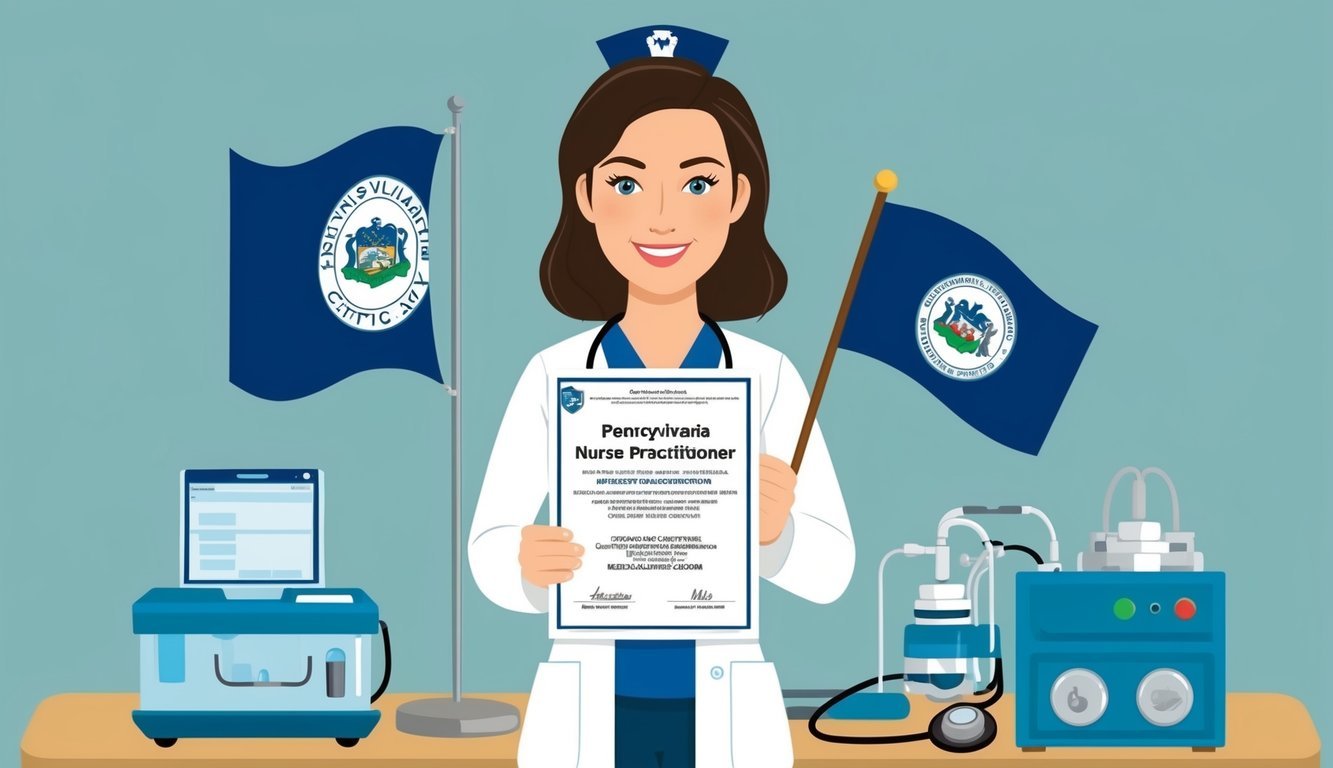Nurse practitioner programs in Pennsylvania offer a pathway to a rewarding healthcare career, blending advanced clinical practice with patient-centered care. These programs provide diverse options, including online and campus-based opportunities, making them accessible to a wide range of students.
As healthcare demands grow, so does the need for skilled nurse practitioners, creating a promising outlook for graduates in this field.
In Pennsylvania, you will find several educational pathways, from Master’s to Doctoral programs, with various certifications available upon completion.
The curriculum emphasizes both theory and hands-on clinical experience, ensuring you are well-prepared for your role.
This dual focus helps to equip you with the knowledge and skills essential for success in different healthcare settings.
Navigating the admission process can seem daunting, but many programs have resources available for financial aid and support.
Understanding the requirements and options available to you can help simplify this journey and set you on the path towards a fulfilling career as a nurse practitioner.
Key Takeaways
- Nurse practitioner programs in Pennsylvania offer varied educational pathways.
- The programs emphasize both theoretical knowledge and practical experience.
- There are resources available to help with admissions and financial aid.
Overview of Nurse Practitioner Programs in Pennsylvania

Nurse practitioner (NP) programs in Pennsylvania prepare you for advanced nursing roles in healthcare.
These programs offer various paths to earn your degree and meet the state’s accreditation requirements.
Understanding the types of programs available and the state-specific accreditation process is crucial for your success.
Types of NP Programs
In Pennsylvania, you can pursue several types of nurse practitioner programs based on your educational background.
Common pathways include:
-
Master of Science in Nursing (MSN): This program is suitable for registered nurses (RNs) who hold a Bachelor of Science in Nursing (BSN). It typically involves advanced nursing courses and clinical practice.
-
Doctor of Nursing Practice (DNP): The DNP is becoming the standard for NPs seeking leadership roles. This program integrates clinical practice with research, equipping you with the skills needed for high-level decision-making.
-
Post-Master’s Certificate Programs: If you already have a master’s degree, these certificates allow you to specialize in areas like family health or pediatrics without starting a new degree.
Each program prepares you for certification as a nurse practitioner, allowing you to provide comprehensive patient care.
State-Specific Accreditation
Accreditation is important for ensuring that your NP program meets the educational standards needed for practice.
In Pennsylvania, the following points are key:
-
Commonwealth of Pennsylvania Certification: After graduation, you need certification from the state, which allows you to work as a Family Health Certified Registered Nurse Practitioner (CRNP).
-
National Certification Eligibility: Graduating from an accredited program qualifies you to apply for national certification, often required for practice. Organizations like the American Nurses Credentialing Center conduct these certifications.
-
Accrediting Bodies: Ensure your program is accredited by recognized agencies, such as the Commission on Collegiate Nursing Education (CCNE) or the Accreditation Commission for Education in Nursing (ACEN), to be eligible for state certification.
Choosing the right accredited program is essential for your future career as a nurse practitioner in Pennsylvania.
Educational Pathways and Degree Options

Choosing the right educational pathway is essential for your career as a nurse practitioner.
You have various degree options, including the Bachelor of Science in Nursing (BSN) leading to higher degrees.
Many programs are available in online formats, making it easier for you to balance education with your current job.
From BSN to DNP
If you already hold a BSN, you can pursue a Master of Science in Nursing (MSN) before advancing to a Doctor of Nursing Practice (DNP).
The MSN program typically involves advanced nursing courses and clinical practice, preparing you for specialized roles.
Once you obtain your MSN, the DNP program allows you to deepen your clinical skills and leadership abilities.
This pathway often focuses on evidence-based practice and healthcare management.
Many DNP programs require 65-68 credits, and you may need to complete practical experience hours.
| Degree | Duration | Credits |
|---|---|---|
| BSN to MSN | 2 years | 36-48 credits |
| MSN to DNP | 1-2 years | 65-68 credits |
You may find programs at institutions like Penn State that offer both MSN and DNP degrees.
Online Education Formats
Many nurse practitioner programs now offer online options, providing you with flexibility.
Online education formats allow you to complete coursework at your own pace, making it easier to fit into your busy schedule.
Programs such as the MSN and DNP frequently offer hybrid formats, where you attend some classes in person while completing other parts online.
This blend often includes web conferences, video lectures, and discussion boards.
When choosing an online program, consider the following:
- Accreditation: Ensure the program is from an accredited nursing school.
- Support Services: Look for schools that offer tutoring and technical support.
- Clinical Placement: Verify how the school helps arrange clinical rotations.
With reputable institutions like DeSales University offering online options, you can further your education without sacrificing your work commitments.
Curriculum and Clinical Experience

In nurse practitioner programs in Pennsylvania, you will encounter a structured curriculum that integrates core and clinical coursework along with extensive clinical experience.
This combination ensures that you develop the necessary skills for advanced practice nursing.
Core and Clinical Coursework
Your program will include a variety of core courses designed to build a strong foundation in nursing practices.
Typical subjects include advanced pathophysiology, pharmacology, and health assessment.
These courses are crucial for understanding complex health issues.
In addition to core courses, you will engage in clinical coursework that emphasizes real-world applications.
Clinical courses often involve hands-on training in various settings, ensuring you gain experience in patient care.
Expect to complete a specific number of clinical hours that vary by program.
Some programs may require as many as 500 hours, while others might demand more.
Advanced Clinical Practice
In advanced clinical practice, you will focus on developing clinical skills necessary for effective patient management.
This aspect of your training prepares you to handle more complex cases and make informed decisions in various healthcare settings.
Programs often include supervised clinical experiences where you work alongside experienced professionals.
This mentorship is vital as it allows you to apply your knowledge in real scenarios.
You will learn to conduct comprehensive assessments, design treatment plans, and provide patient education.
Specialization in Patient Populations
Many programs offer tracks that allow you to specialize in specific patient populations.
Examples include pediatrics, geriatrics, or acute care.
Specialization helps tailor your education to the areas you are most passionate about.
Each specialization comes with its own set of courses and clinical experiences.
For instance, if you choose pediatrics, you will focus on child development, common pediatric illnesses, and family dynamics.
This specialized training enhances your ability to provide targeted care to diverse groups of patients.
Certification and Licensure

In Pennsylvania, becoming a nurse practitioner (NP) requires meeting specific certification and licensure requirements.
This section provides important details about exam preparation, pass rates, continuing education, and re-certification.
Exam Preparation and Pass Rates
To become a certified nurse practitioner, you must pass a national certification exam.
Key organizations include the American Academy of Nurse Practitioners (AANP) and the American Nurses’ Credentialing Center (ANCC), which offer different certification routes.
To prepare for the exam, focus on recommended study materials, practice tests, and review courses.
Many candidates benefit from joining study groups.
Here are some common national certification exams:
| Certification Body | Exam Type | Pass Rate (%) |
|---|---|---|
| American Academy of Nurse Practitioners | Family NP | 88 |
| American Nurses’ Credentialing Center | Family NP | 93 |
| Both AANP and ANCC | Adult-Gerontology NP | 90 |
It is crucial to verify the latest pass rates and study options through the respective organizations’ websites.
Continuing Education and Re-Certification
To maintain your certification, you must complete continuing education (CE) requirements.
The AANP and ANCC mandate a specific number of CE hours within a five-year period.
This ensures you stay updated with the latest practices and standards in healthcare.
In addition to CEs, you should participate in professional development activities.
This could include attending workshops, conferences, or taking additional courses.
Keep track of your CE credits because failing to meet requirements can affect your certification status.
The re-certification process typically involves submitting proof of completed CE activities and passing a recertification exam.
For more detailed guidelines, visit the AANP and ANCC websites.
Career Opportunities and Outcomes

As a nurse practitioner (NP) in Pennsylvania, you will find diverse roles and settings, along with a significant impact on healthcare delivery.
Understanding these opportunities will help you navigate your career and influence patient care positively.
Roles and Settings for NPs
Nurse practitioners serve in various healthcare environments, including hospitals, clinics, and private practices.
Common roles include:
- Primary Care Provider: Delivering routine check-ups and preventive care.
- Specialty Care Provider: Focusing on specific fields, such as pediatrics or geriatrics.
- Emergency Care: Providing immediate care in urgent situations.
In Pennsylvania, many NPs work in urban areas like Philadelphia and Pittsburgh, which have a high demand for healthcare services.
You may also work in underserved communities, enhancing access to quality care.
With advanced practice registered nurse (APRN) status, NPs can diagnose, treat, and manage health conditions independently.
The flexibility in practice settings allows you to tailor your career based on your interests and community needs, ensuring impactful nursing care.
Impact on Healthcare Delivery
Nurse practitioners play a crucial role in improving healthcare delivery and patient outcomes.
By focusing on disease prevention and health promotion, NPs help reduce hospital readmission rates and emergency room visits.
Their contributions include:
- Comprehensive Patient Care: Managing chronic illnesses and conducting regular assessments.
- Patient Education: Informing patients about health management and prevention strategies.
- Collaboration: Working with other health professionals to develop effective care delivery models.
Nurse practitioners increase healthcare access, especially in rural areas.
Their presence leads to shorter wait times and improved patient satisfaction.
As healthcare continues to evolve, your role as an NP will be vital in shaping the future of nursing practice and enhancing the quality of care.
Admission Requirements and Financial Aid
Entering a nurse practitioner program in Pennsylvania involves meeting specific admission requirements and understanding available financial aid options.
By preparing thoroughly, you can navigate the process smoothly.
Application Deadlines and Prerequisites
Each program has its own application deadlines.
These deadlines can fall anywhere between December and March for fall admissions.
Check individual school websites for exact dates.
Common prerequisites include:
- A valid nursing license (RN)
- A Bachelor of Science in Nursing (BSN) or equivalent
- Minimum GPA requirements (often around 3.0)
- Relevant work experience (clinical settings are preferred)
For international applicants, English proficiency tests like the TOEFL or IELTS may be required.
Gather all transcripts and recommendation letters well before the deadline to avoid last-minute issues.
Scholarships and Funding Options
Financial aid plays a crucial role in funding your education.
Several scholarships and funding options are available for nurse practitioner students in Pennsylvania.
Types of Financial Aid:
- Federal Aid: Complete the FAFSA to determine eligibility for federal loans or grants.
- State Programs: Pennsylvania offers grants like the PHEAA State Grant for eligible residents.
- Scholarships: Institutions often provide scholarships based on merit or need. Example scholarships include the Nurse Practitioner Scholarship Fund.
Reach out to financial aid offices at your chosen schools for guidance on available resources.
They can offer tailored advice based on your situation.
For further exploration, visit PHEAA for state-specific options.
Frequently Asked Questions
This section provides clear answers to common questions about nurse practitioner programs in Pennsylvania.
You will find details about top-rated programs, online options, accreditation, and requirements.
What are the top-rated nurse practitioner programs in Pennsylvania?
Some of the top-rated nurse practitioner programs in Pennsylvania include those from the University of Pennsylvania and Drexel University.
These programs stand out for their comprehensive curriculum and strong clinical experiences.
You can explore more about the best options in the state here.
Can one complete a nurse practitioner program in Pennsylvania entirely online?
Yes, some nurse practitioner programs in Pennsylvania offer online options.
Programs at schools like Penn State World Campus allow for a significant part of the coursework to be done online.
However, some in-person requirements may remain, such as clinical practicums.
Which nurse practitioner programs in Pennsylvania are fully accredited?
It is important to choose an accredited nurse practitioner program.
Schools like the Pennsylvania State University and Temple University have programs accredited by the Commission on Collegiate Nursing Education.
Checking accreditation ensures that the program meets industry standards.
How long is the typical duration to become a nurse practitioner in Pennsylvania?
Typically, becoming a nurse practitioner in Pennsylvania takes about 2-4 years, depending on the program type.
For instance, a master’s degree usually requires 2-3 years, while a Doctor of Nursing Practice (DNP) might need an additional year or two.
Each program varies in length and structure.
What are the admission requirements for the University of Pennsylvania’s Nurse Practitioner program?
Admission requirements for the University of Pennsylvania’s Nurse Practitioner program may include a BSN degree, a valid RN license, and a minimum GPA.
Additionally, you may need to submit letters of recommendation and a personal statement detailing your professional goals.
Between a Physician Assistant (PA) and Nurse Practitioner (NP), which career path offers better opportunities in Pennsylvania?
Both career paths offer strong opportunities in Pennsylvania.
However, NPs may have greater autonomy in patient care.
The demand for healthcare providers continues to grow, making both professions promising.
Research specific job markets and salary expectations for more tailored information.

